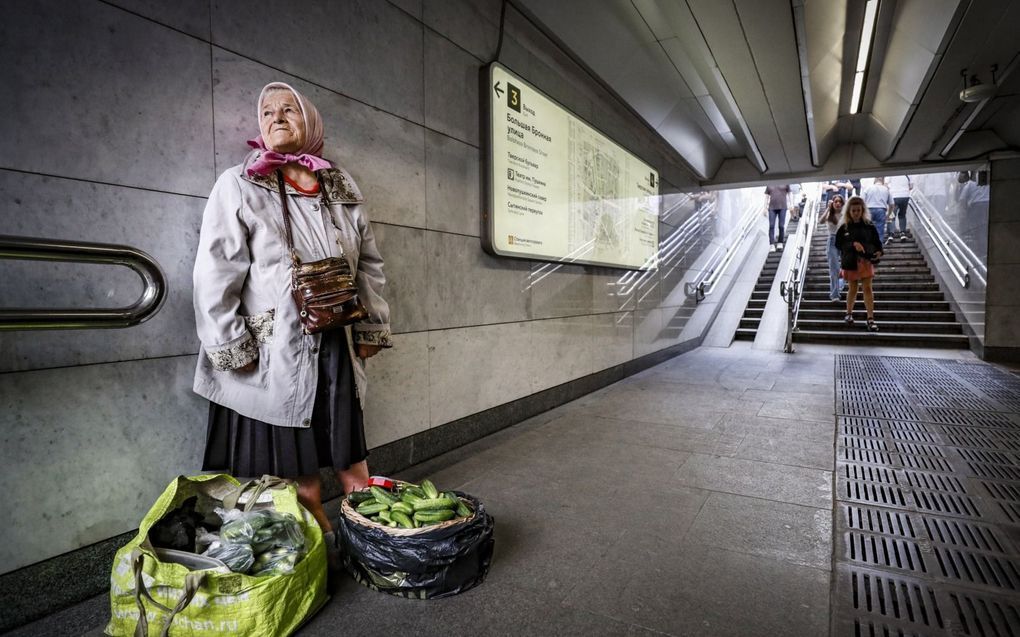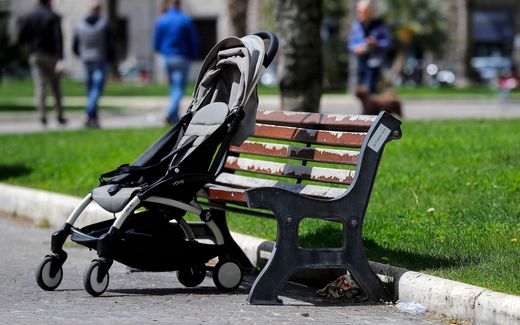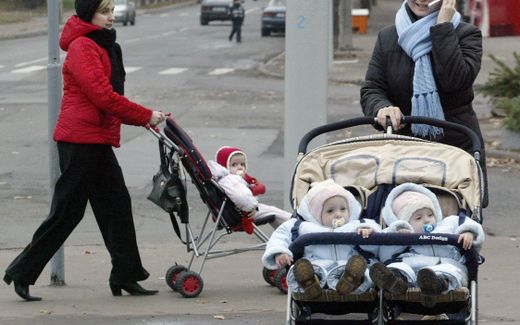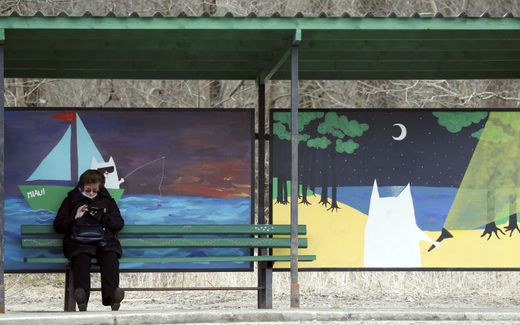Born under Stalin, retired under Putin
25-07-2022
Eastern Europe
William Immink, RD

An elderly woman sells cucumbers on the Moscow metro. Photo EPA, Yuri Kochetkov
Eastern Europe
The older generation in Russia sometimes thinks back to the era of the Soviet Union with nostalgia. "The respect for older people is completely gone now."
It is almost noon when Lyudmila Afanasievna emerges from her grey apartment in Izhevsk and staggers toward her peers, leaning heavily on her four-legged walking stool. Yes, Afanasievna no longer walks as fast as she did a few years ago; there is grit in her hips. The Russian grannies -babushki- find each other under the leafy birch tree that serves as a shelter from the bright July sun. The 74-year-old lady takes a seat on a simple bench without a backrest. During the day, the old people sit here, and in the evening, the alcoholics.
This is the first part of a two-part series on demography in Europe. On Tuesday part 2: Spain.
Under the white birch tree, the elderly discuss the news from the neighbourhood. They are the first to know if someone has bought a new car. Rumours and gossip go quickly here. But also, if a peer has died, they are the ones who say goodbye.
But the babushki also visibly enjoy the little ones playing on the swing and in the sandpit, screaming and playing tag: it reminds them of their childhood. Of course, there is also criticism of the young, inexperienced mothers. "Dress your child better," cries a babushka. "It's still cold."
Scary
Lyudmila Afanasievna particularly enjoys the offspring that runs past her newly repainted bench. She hardly ever sees her grandchildren and great-grandchildren. "My husband doesn't dare drive in the city centre; much too scary," she explains, recounting at length a minor accident her husband had the other day with their Lada. "And the children don't come to visit us either," she says somewhat sadly.
Whether Russians respect older people? "I try not to give advice to young people anymore because they don't listen anyway. They have a completely different worldview," she sighs. The generation gap in Russia is huge. The babushki grew up as pioneers: the Soviet youth. The current generation is growing up in a capitalist Russia with iPhones and other gadgets: "Their best friend is their phone," Afanasievna says of her great-grandchildren.
Another babushka -coincidentally also named Lyudmila- shakes her head vehemently. "No, the respect for older people is completely gone in the younger generation. The other day I was standing on the bus, and an old woman with a walking stick stepped into the bus. She clearly wanted to sit down, but no one stood up. I said something about it but got a big mouth in return. In the future, I'll keep my mouth shut." Afanasievna agrees with her. "We sometimes miss the Soviet Union."

Of course, it's also about that: the Soviet Union. Because almost all elderly people in Russia look back at it with melancholy and nostalgia. "We lived poorer, but the people were kinder. Now everyone is so blunt and mean." But then came the 1990s, after the fall, when wages were not paid, and no one had to eat. "Yeltsin, that drunk, I never respected that," Afanasievna agitates. She chuckles.
Aging
Russia is one of the most ageing countries in the world. Especially in the 1990s, the number of births dropped due to the economic malaise caused by the fall of the Soviet Union. While the average number of children per woman in the late 1980s was 2.2 (just enough to sustain the population), it has now dropped to 1.5. At least it is still better than the 1.1 in the crisis years of 1998 and 1999.
In 2020 and 2021, the population of Russia shrank again worryingly, by half a million and a million a year, respectively. The immediate cause was the pandemic, but the underlying problem is the natural dip in the number of adults of childbearing age. In other words, the people who were not born in the 1990s are not having children now.
There are solutions, though, such as financial allowances so families will dare to have more than one child. Women get about 10,000 euros for their second child, converted to housing, retirement or education investments. In addition, families receive about 10,000 rubles (150 euros) a month per child. The conflict in Ukraine will turn demographics upside down again.
Retiring later
An ageing population means that an increasing number of older people depend on fewer younger people. It also means that the retirement age must go up. In the summer of 2018, thousands of people took to the streets to protest this. The sudden announcement shocked the nation, accustomed to relying on the government. Henceforth, men would retire at 65 (was 60), women at 60 (was 55). With the average life expectancy of 66 years for Russian men, nearly half of all men would not make it to retirement. Because women in Russia generally drink and smoke less, they make it to 77 on average.
The reason for the low life expectancy of Russian men is primarily vodka. Not only do men die from direct effects, such as alcohol poisoning and liver disease, but also from indirect effects of alcohol such as suicides, accidents and fights. About 25 per cent of all men die before the age of 55.
Bricks
Afanasievna still has her husband, and he is even more vital than she is. So once every two days, Afanasievna gets into the passenger seat of a square Lada 2107 and drives with her husband to their dacha. "To water the tomatoes in the greenhouse and harvest the cucumbers," she explains. On the dashboard is a small fan because the old Lada has no air conditioning. For herself, the fun is over. "My husband does everything by himself now because I'm up," she explains. "He just said yesterday that we should sell the dacha."

At the age of 55, in 2003, Afanasievna retired. But she didn't really stop working until five years ago. Before that, she was still working in the factory that made bricks. "Then I was fit, but now..." she sighs and points to her legs.
According to her, the elderly don't have it bad in Russia, by the way. "Because I am a labour veteran, I receive all kinds of benefits. Both my husband and I get 450 rubles extra a month. And we also get another 1,000 rubles per person discount on our gas, water and light bills. All in all, we get almost 50,000 rubles (700 euros) in the month." Since the new constitution, pensions have been indexed annually.
Future
Although Afanasievna has been married for over fifty years, things have not been going smoothly lately. "My husband and I don't understand each other anymore. He watches television; I don't. I walk with a cane; he is still fit and always has to wait for me. He's even a bit ashamed of me. I just want rest, but he still has a zest for life."
Falling ill is the fear of every elderly person because a nursing home is not known here. "There are those homes that then take over your apartment," says the other Lyudmila. "You don't want to end up there." Those who fall ill depend on the help of family members, like old Anatoli. He died of a series of strokes this winter. Now his wife walks their dog.
Afanasievna finds the world situation just scary. "For myself, I'm not worried. But I do for my grandchildren. I hope there won't be a war here." It's a good thing Putin is around, she says. "How he solves all these problems in our territories. After all, they wanted to take Crimea. He should have intervened much earlier."
Potato Flowers
When other grannies have also taken their seats under the white, leafy birch, the conversation soon turns to the pains that come with ageing. "When the potatoes bloom, I pick the flowers," Nina Alexandrovna explains. "I've heard that it's healing if I dry them and dissolve them in a cup of alcohol. With a compression cloth, I then hold that on my knees."
Afanasievna also comes up with her alternative prescriptions because she doesn't go to the doctor anymore. "We are already consumed material; that's how people in the hospitals look at us." It's very simple: those who drink die quickly, and those who invariably abstain live longer.
At that moment, Valeri Pavlovich approaches: "Forgive me for disturbing you," he interrupts Afanasievna. "Do you have a cigarette for me, perhaps?" The cosy chatter and romance of growing old in Russia are rudely disrupted by raw reality. Valeri Pavlovich has clearly had too much to drink. And it is, by the way, still morning.
"I am already 66 years old," says Valeri Pavlovich, who has been retired for six years. So by Russian standards, he is an old man. Why does he think men in Russia live shorter lives? "That's because they smoke more," chuckles Valeri. He raises his shirt to show that he recently had surgery. "And because of alcohol."
Valeri's pension is not much, but according to him, "enough to make ends meet." Every day he walks between the flats. "I know most people here," he says. "And if I don't know someone, we get acquainted." And the so-unhealthy alcohol helps a hand; it loosens tongues.
This article was translated by CNE.news and previously published in Dutch daily Reformatorisch Dagblad on July 20th, 2022.
Related Articles





